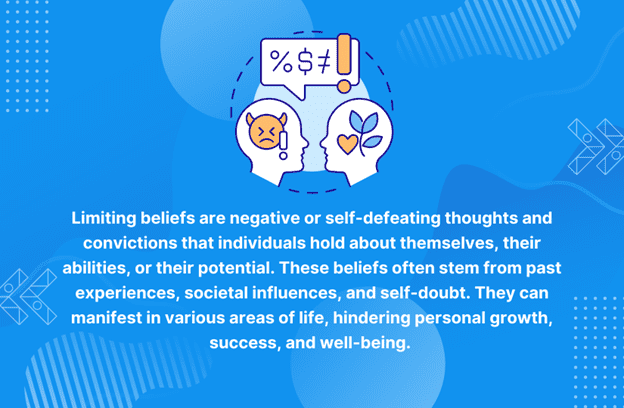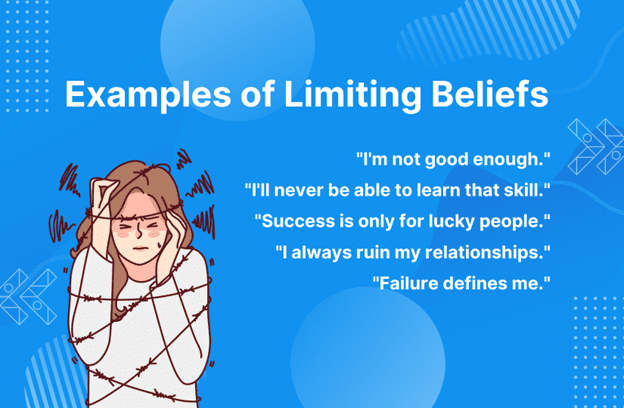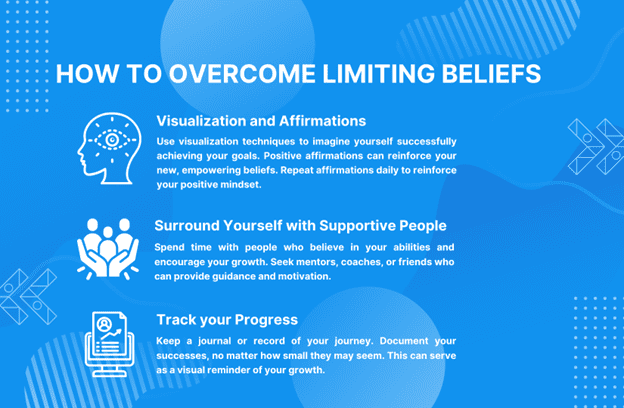Have you ever told yourself, “I’m not good at this, so I should stay away from this”? These ideas frequently stem from a place of fear and negativity that prevents us from taking advantage of fresh chances. They are known as limiting beliefs.
You’re not alone if you’ve experienced similar thoughts. Self-limiting beliefs are a problem for many professions and even business owners since they can prevent success. The secret to overcoming limiting ideas is learning to recognize them.
What are Limiting Beliefs?
Limiting beliefs are ideas or convictions that people have about themselves, their capacities, or their potential that are unfavorable or self-defeating. Because they constrain a person’s actions and mentality, these beliefs frequently obstruct personal development, achievement, and wellbeing. Limiting beliefs can take many different forms and have an effect on a variety of elements of life, such as a person’s work, relationships, health, and level of general happiness.
People with limiting beliefs often engage in negative self-talk, where they constantly criticize themselves, doubt their abilities, or focus on their perceived shortcomings. Limiting beliefs can lead to self-doubt and a lack of confidence. Individuals may believe they are not capable of achieving their goals or that they are unworthy of success or happiness.
Some people desire perfection from themselves because of limiting ideas. They are paralyzed and unable to act because they feel that anything less than perfection is unacceptable. Limiting beliefs may cause people to attribute their problems or lack of advancement to outside forces or events. They are unable to accept responsibility or make constructive changes as a result of this thinking.

What Causes Limiting Beliefs?
Limiting beliefs can be caused by a variety of factors and experiences throughout a person’s life. These beliefs often develop gradually and are influenced by a combination of internal and external factors.
Early childhood experiences, such as criticism, rejection, or trauma, can shape a person’s self-perception and lead to the development of limiting beliefs. For example, a child who constantly hears negative messages about their abilities may grow up believing they are not capable of success.
Society, culture, and family play significant roles in shaping a person’s beliefs. If an individual is raised in an environment where certain limitations are placed on them based on their gender, race, or socioeconomic background, they may internalize these limitations as beliefs about their own capabilities.
Continual negative self-talk and a critical inner voice can contribute to the development and reinforcement of limiting beliefs. When a person repeatedly tells themselves they are not good enough or capable enough, they start to believe it. Experiencing traumatic events, such as accidents or abuse, can create feelings of powerlessness and lead to beliefs that one is helpless or unable to control their life.
Recommended Read: 20 Ways to Build Your Mindset and Boost Your Self-Confidence
Impact of Limiting Beliefs to your Everyday Life
Limiting beliefs can have a profound and often detrimental impact on your everyday life in various ways. It can hold you back from reaching your full potential. They can make you doubt your abilities and potential for success, causing you to settle for less than you are capable of achieving. It can often lead to fear and avoidance. You may avoid situations where you think you might fail or face rejection, limiting your experiences and personal growth.
Believing you’re not worthy or capable can cause you to miss out on valuable opportunities, both personally and professionally. You may decline promotions, avoid pursuing your passions, or shy away from new relationships due to these beliefs.
Limiting beliefs can also be impactful that can affect your relationships by making you more self-conscious and less open to new connections. You might be reluctant to open up to others or be vulnerable, which can hinder the development of meaningful relationships. Constantly harboring limiting beliefs can contribute to stress, anxiety, and even depression. The negativity and self-criticism associated with these beliefs can take a toll on your mental and emotional well-being.

20 Examples of Limiting Beliefs
1. Self-Worth and Confidence
“I’m not good enough.”
“I’m not worthy of love or success.”
“I don’t deserve happiness.”
2. Abilities and Skills
“I’m not talented enough to pursue my passion.”
“I’ll never be able to learn that skill.”
“I’ll never get that promotion; I’m not smart enough.”
“Success is only for lucky people.”
4. Financial Beliefs
“I’ll always struggle with money.”
“I can’t make a living doing what I love.”
5. Relationships
“I’m unlovable.”
“I always ruin my relationships.”
6. Health and Wellness
“I’ll never lose weight; I have bad genetics.”
“I can’t stick to a healthy lifestyle.”
7. Age-Related Beliefs
“I’m too old to start something new.”
“Youth is the only time for adventure.”
8. Fear of Failure
“I’m terrified of failing, so I won’t even try.”
“Failure defines me.”
9. Fear of Rejection
“I can’t approach people; they’ll reject me.”
“I’ll never make new friends; I’m too different.”
10. Perfectionism
“If I can’t do it perfectly, I won’t do it at all.”
“Mistakes are unacceptable.”
11. Negative Future Outlook
“The future is bleak; things will only get worse.”
“I’ll never achieve my dreams.”
12. Limited Beliefs about Opportunities
“Opportunities never come my way.”
“There’s only one path to success, and I missed it.”
13. Social Comparisons
“I’ll never be as successful as [someone else].”
“Everyone else has it easier than me.”
14. Lack of Control
“I can’t change my circumstances; I’m powerless.”
“Life just happens to me.”
15. Dependency Beliefs
“I need someone to take care of me; I can’t do it alone.”
“I can’t be happy without [something or someone].”
16. Beliefs about Time
“There’s not enough time to pursue my dreams.”
“I’m always too busy.”
17. Beliefs about Happiness
“Happiness is fleeting and can’t be sustained.”
“I’ll only be happy when [external condition] is met.”
18. Trust Issues
“I can’t trust anyone; people always let me down.”
“I’ve been hurt too many times to trust again.”
19. Beliefs about Creativity
“I’m not a creative person.”
“I can’t come up with new ideas.”
20. Beliefs about Change
“Change is scary and should be avoided.”
“I can’t adapt to new situations.”
Everyone possesses these ideas, which stem from a place of fear. In order to avoid being prevented from stepping beyond your comfort zone by limiting beliefs, you must learn how to recognize them and challenge them.
You might be tempted to tell yourself that you’re not good enough or that you’ll never be good enough in order to be safe. However, these beliefs ultimately limit you from enabling yourself and your team to be the best.

How to Overcome Limiting Beliefs
Overcoming limiting beliefs is a transformative process that requires self-awareness, determination, and consistent effort.
Start by recognizing the specific limiting beliefs that are holding you back. Pay attention to your self-talk and thought patterns. What negative thoughts consistently surface in different areas of your life? Ask yourself if there is concrete evidence supporting these beliefs. Are they based on facts or assumptions? Challenge the validity of these beliefs with a critical and rational mindset.
Look for examples of people who have overcome similar challenges or achieved what you aspire to achieve. This can help you see that your limiting beliefs are not absolute truths. Replace self-criticism with self-compassion. Understand that everyone has doubts and fears, and it’s okay to make mistakes. Treat yourself with kindness and understanding as you work to change your beliefs.
Surround yourself with mentors who can help you and who inspire you.
Transform negative thoughts into positive and empowering ones. For example, if you believe, “I’m not good enough,” reframe it as “I am continually improving, and I have the ability to learn and grow.” Break down your goals into smaller, manageable steps. This can make your objectives seem less daunting and help you build confidence as you make progress.
Use visualization techniques to imagine yourself successfully achieving your goals. Positive affirmations can reinforce your new, empowering beliefs. Repeat affirmations daily to reinforce your positive mindset. Spend time with people who believe in your abilities and encourage your growth. Seek mentors, coaches, or friends who can provide guidance and motivation. Keep a journal or record of your journey. Document your successes, no matter how small they may seem. This can serve as a visual reminder of your growth.
Cultivate mindfulness to stay present and reduce anxiety about the future. Self-awareness can help you catch and address limiting beliefs as they arise. Overcoming limiting beliefs is not a quick fix; it’s an ongoing process. Be patient with yourself and stay committed to the journey of personal growth.
Conclusion
In conclusion, limiting beliefs are deeply ingrained negative thought patterns and convictions that can hold individuals back from realizing their true potential and living a fulfilling life. These beliefs often stem from past experiences, societal conditioning, and self-doubt. They manifest in various forms, including doubts about one’s abilities, fears of failure or rejection, and negative self-perceptions.
Overcoming limiting beliefs is a transformative journey that begins with self-awareness and a commitment to change. By identifying these beliefs, individuals can challenge their validity and seek evidence to the contrary. They can practice self-compassion, reframing negative thoughts into positive ones, and setting realistic goals to build self-confidence.
It can be really beneficial to be surrounded by a network of people who support you and think highly of you. Personal development requires constant action, even in the face of fear. One’s mindset can be changed with the help of strategies like visualization, affirmations, and mindfulness. The procedure calls for endurance, perseverance, as well as an openness to new information and adaptation.
Lastly, overcoming limiting beliefs is a journey toward empowerment and self-discovery. It enables people to overcome self-imposed limitations, follow their passions, and realize their objectives. It’s a path that can result in better relationships, higher self-esteem, and a more successful and meaningful life. People can reach their greatest potential and live a life inspired by their aspirations rather than their constraints by confronting and changing these beliefs.
Start your 14-day Trial today to start and launch your online business on Vonza. Make money while you sleep!

